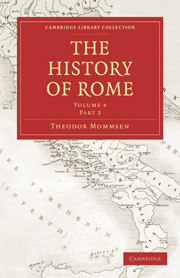CHAPTER X - BRUNDISIUM, ILERDA, PHARSALUS, AND THAPSUS
Published online by Cambridge University Press: 07 September 2010
Summary
The resources on either side
Aems were thus to decide which of the two men who had hitherto jointly ruled Rome was now to be its sole ruler. Let us see what were the comparative resources at the disposal of Cæsar and Pompeius for the impending struggle.
Cæsar's absolute power within his our party
Labienus
Cæsar's power rested primarily on the wholly unlimited authority which he enjoyed within his own party. If the ideas of democracy and of monarchy met together in it, this was not the result of a coalition which had been accidentally entered into and might be accidentally dissolved; on the contrary it was involved in the very essence of a democracy without a representative constitution, that democracy and monarchy should find in Cæsar at once their highest and ultimate expression. In political as in military matters throughout the first and the final decision lay with Cæsar. However high the honour in which he held any serviceable instrument, it remained an instrument still; Cæsar stood in his own party without confederates, surrounded only by military-political adjutants, who as a rule had risen, from the army and as soldiers were trained never to ask the reason and purpose of anything, but unconditionally to obey. On this account especially, at the decisive moment when the civil war began, of ail the officers and soldiers of Cæsar one alone refused him obedience; and the circumstance that that one was precisely the foremost of them all, simply confirms this view of the relation of Cæsar to his adherents.
- Type
- Chapter
- Information
- The History of Rome , pp. 362 - 449Publisher: Cambridge University PressPrint publication year: 2010First published in: 1866



